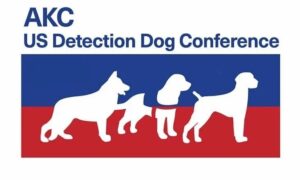
The first AKC Detection Dog Conference revealed a basic dilemma:
There was a considerable gap in the supply chain between the person who breeds dogs and the person wanting to train dogs for sale as a detection dog training candidate. That gap was the development period. Breeders like to sell puppies, whereas those training detection dogs want raw recruits with fixed traits and characteristics, having completed the majority of their development.
The result of the ensuing discussion was the founding of an AKC task force to dive deeper into the many facets of this problem. We needed to better inform our legislators about government reliance on foreign sources for dogs and ways to level the economic playing field for domestic breeders to compete with other sources. We needed to have a pilot puppy raising program for American breeders to prove the value of their dogs. We needed more education on puppy raising schemes that might separate the average dog from the elite detector. We needed analysis of collected data to prove the validity and reliability of domestically sourced canines for detection work.
The government has proven over time that they do not have the vision or determination to run centralized canine breeding facilities. The whims and trends of political futures, the financial investment in long term canine production, and resistance to move from comfortable-but not progressive-traditions have made governmental canine breeding programs short term novelties. Ironically, not-for-profit philanthropies providing service dogs have had both the vision and determination to prove the value of “in house” breeding programs within our nations borders.
Today the AKC is determined to have domestic breeders provide the canine training candidates for our national security. Through the AKC’s and others impassioned pleas, the federal government signed into law the need for a non-federal and non-centralized canine breeding effort for detection dogs. Now the question to our nation’s breeders and trainers is: “are we up to the challenge?”
The AKC established the Patriotic Puppy Program in October of 2018 in a proposal accepted by the board of directors. In February of 2019 we asked for people interested in breeding and raising dog to apply for the program. The program would offer advice and support through a website, social media, email, and data collection. To date there are just under 100 people who have accepted the challenge.
We have great hope that this program will grow in function and form. First, we must prove that the average dog breeder can, with assistance and support, breed and raise dogs for deployment in detection dog jobs. Second, we must prove that American dogs are every bit as capable as dogs imported from other nations. Third, we must mobilize as Americans to keep our government representatives aware of an often-ignored national resource. In a perfect situation, there would be unlimited resources to fund a national center of detection dog excellence. This would enable the breeders in our country to supply young dogs to such an effort, where they could be raised or fostered with a very specific goal in mind. Best practices in genetic selection and improved behavioral development could easily control for high rates of success. Such a center could ensure that a dog not meeting the most exacting standards could be placed in a working role more suited to their character. We will need to prove the idea before such dreams can become a reality.
In the meantime, we need people to face this challenge. We need breeders to raise dogs to prove the value of their genetic selection. We need people to raise a puppy to the standards declared by those seeking detection dog candidates. Most importantly, we need program participants who are willing to take a dog they are invested in and sell or donate the dog to a law enforcement role. We wish we could guarantee everyone success, but we cannot. We wish we could guarantee there will be people standing in line waiting for these dogs as they mature, but we cannot. We wish that there were standards of assessment for dogs that are consistent and reasonable, but we cannot. Though we cannot make these guarantees today, tomorrow is another question. We are working to build educational modules to increase the rates of success. We are working feverishly to bridge the gap between those who have dogs and those who want to procure dogs. We are heavily involved in federal efforts to standardize and simplify assessment and procurement processes. We have accomplished a great deal in a short time. We can only meet all these goals if we work as a community resolved to make sure that domestically bred canines are the first choice for law enforcement agencies seeking the world’s best detection dogs.

